Gene McKenzieSeoul Correspondent
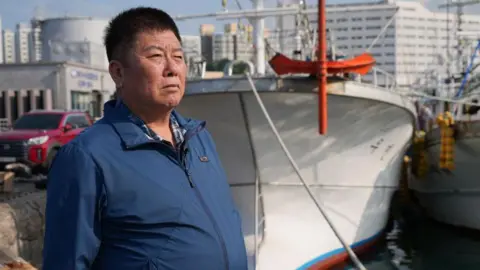 BBC/Hosu Lee
BBC/Hosu LeeHong Suk Hee was waiting on the shore of Jeju Island in South Korea when the call rang. His fishing boat capsized.
Just two days earlier, the ship had set off on what he had hoped would be a long and fruitful voyage. But as the wind increased, his captain was ordered to turn back. On the way to the port, a powerful wave hit from both sides, forming a whirlpool, and the boat capsized. Five of the ten crew members, sleeping in their cabins below deck, drowned.
“When I heard the news, it felt like the sky was falling,” Mr Hong said.
Last year, 164 people died or went missing in accidents in the seas around South Korea – a 75% increase from the year before. Most of them were fishermen whose boats sank or capsized.
“The weather has changed, getting windier every year,” said Mr Hong, who is also chairman of the Jeju Fishing Boat Owners Association.
“Whirlwinds arise suddenly. We fishermen are convinced that this is due to climate change.”
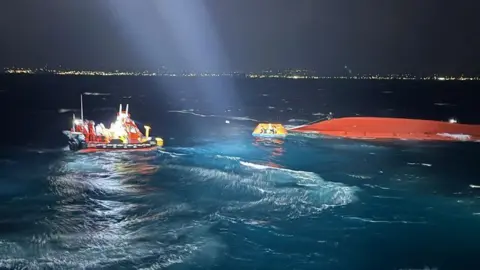 South Korean Coast Guard
South Korean Coast GuardAlarmed by the rise in deaths, the South Korean government has launched an investigation into the accidents.
This year, the head of the task force cited climate change as one of the main reasons, and also highlighted other problems – the country's aging fishing workforce, increasing dependence on migrant workers and poor safety training.
The seas around Korea are warming faster than the global average, in part because they tend to be shallower. Between 1968 and 2024, the country's average sea surface temperature rose by 1.58°C, more than double the global increase of 0.74°C.
Warming waters contribute to extreme weather conditions at sea, creating conditions for intensifying tropical storms such as typhoons.
They also force some fish species around South Korea to migrate, forcing fishermen to travel further and take greater risks to catch enough fish to make a living, according to the country's National Fisheries Institute.
Environmental campaigners say urgent action is needed to “stop the tragedy occurring in Korean waters.”
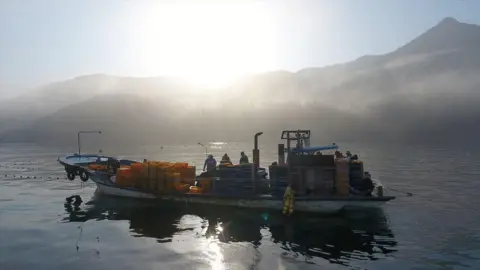 BBC/Hosu Lee
BBC/Hosu LeeOn a rainy June morning, Jeju Island's main harbor was crowded with fishing boats. Crews hurried back and forth between sea and land, refueling and stocking up for the next voyage, while boat owners paced the pier anxiously, overseeing final preparations.
“I'm always afraid that something might happen to the boat, the risks have increased so much,” said owner Kim Seung-hwan, 54. “Winds have become more unpredictable and extremely dangerous.”
Several years ago, Mr. Kim began to notice that the popular silvertail fish he relied on was disappearing from local waters, and his income fell by half.
Now his teams must travel into deeper and more dangerous waters to find them, sometimes going as far south as Taiwan.
“As we move on, it's not always possible to get back quickly when there's a storm warning,” he said. “If we stayed closer to the shore it would be safer, but to make a living we need to go further.”
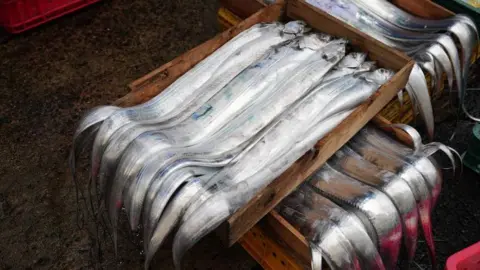 BBC/Hosu Lee
BBC/Hosu LeeProfessor Gug Seung Gi led an investigation into the recent accidents, which found that South Korea's seas had become more dangerous. It noted that the number of marine weather warnings around the Korean Peninsula warning fishermen of storms, storm surges and typhoons increased by 65% between 2020 and 2024.
“Unpredictable weather is causing more boats to capsize, especially smaller fishing vessels that go further out and are not designed for such long, rough journeys,” he told the BBC.
Professor Kim Baek-min, a climate scientist at Pukyung National University in South Korea, said that while climate change is creating conditions for an increased likelihood of strong, sudden gusts of wind, a clear trend has not yet been established – more research and long-term data are needed.
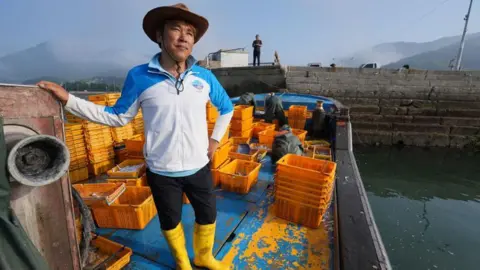 BBC/Hosu Lee
BBC/Hosu LeeOne foggy morning, we set sail from the shore in the dark on a small trawler with Captain Park Hyun-il, who has been fishing anchovies off the southern coast of Korea for more than 25 years. He sang sea shanties, determined to remain optimistic. But when we got to the nets, which he had left for the night, his mood soured.
When he reeled them in, the anchovies could barely be seen among the hordes of jellyfish and other food. Once the anchovies were separated, they only filled two boxes.
“We used to fill 50 to 100 of these bins in one day,” he said. “But this year the anchovies have disappeared and we are catching more jellyfish than fish.”
This is the predicament facing tens of thousands of fishermen along the South Korean coastline. Over the past 10 years, the number of squid caught in South Korean waters each year has fallen by 92%, and anchovy catches have dropped by 46%.
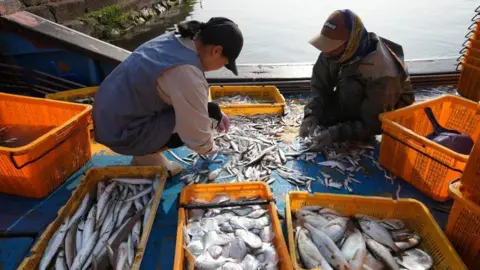 BBC/Hosu Lee
BBC/Hosu LeeEven the anchovies caught by Park are unsalable and will have to be sold as animal feed, he said.
“Basically, this cargo is worth nothing,” he sighed, explaining that it would barely cover a day’s fuel costs, not to mention his crew’s wages.
“The sea is a mess, nothing makes sense anymore,” Puck continued. “I used to like this job. It was nice to know that someone, somewhere in the country, was eating the fish I caught. But now, when there is almost nothing to catch, this feeling of pride is fading.”
And as livelihoods disappear, young people no longer want to join the industry. In 2023, nearly half of South Korea's fishermen were over 65, up from less than a third a decade earlier.
Elderly captains increasingly have to rely on migrant workers from Vietnam and Indonesia for help. Often these workers do not receive sufficient safety training, and language barriers mean they cannot communicate with captains, further exacerbating the danger.
Woojin Chung, South Korea's chief representative at the UK-based Environmental Justice Foundation, called it a “vicious and tragic cycle”.
When you combine more extreme weather conditions with the need to travel further, higher fuel costs and the need to rely on cheap, untrained foreign labor, “you're more likely to run into disaster,” she explained.
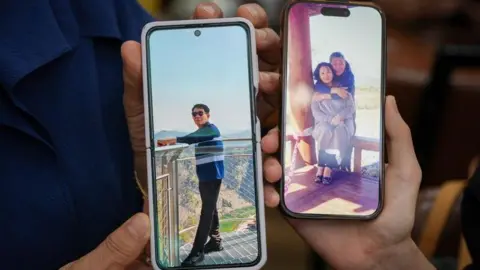 BBC/Hosu Lee
BBC/Hosu LeeOn February 9 this year, a large sea trawler suddenly sank near the coastal city of Yeosu, killing 10 crew members. The day was very cold and windy, and smaller vessels were prohibited from going to sea, but this trawler was considered strong enough to withstand the storm. The cause of the fall still remains a mystery.
One of those killed was 63-year-old Yong Muk. A fisherman for 40 years, he was about to retire, but that morning someone called and asked him to fill a last-minute vacancy on a boat.
“It was so cold that if you fell in there you wouldn't survive hypothermia, especially at his age,” said his daughter Iain, still distraught over his death.
Ian believes it has become too easy for boat owners to blame climate change for accidents. Even in cases where bad weather plays a role, she believes the responsibility for assessing the risks and ensuring the safety of their team still lies with the owners. “Ultimately it is their right to decide when to go out,” she said.
 BBC/Hosu Lee
BBC/Hosu LeeAs a child, she remembers her father's refrigerator being full of crabs and squid. “Now the stocks are gone, but the companies are still forcing them out, and because these people have been fishermen all their lives, they have no alternative work options, so they continue to fish even when they are too weak to do so,” she said.
Ian also wants owners to do a better job of maintaining their boats, which are also aging. “Companies have insurance so they get compensation after the boat sinks, but our loved ones cannot be replaced.”
Authorities, aware they can't control the weather, are now working with fishermen to make their boats safer. As in the case of Mr Hong, whose boat capsized earlier this year, a team of government inspectors arrived to conduct a series of on-site inspections of his two other vessels.
The government task force recommends that boats be equipped with safety ladders, that fishermen be required to wear life jackets and that safety training be made mandatory for all foreign crew. He also wants to improve search and rescue operations, as well as give fishermen access to more localized, real-time weather updates.
Some regions are even offering to pay fishermen for the jellyfish they catch to try to clean up the sea, while giving squid fishermen loans to protect them from bankruptcy and encourage them to retire.
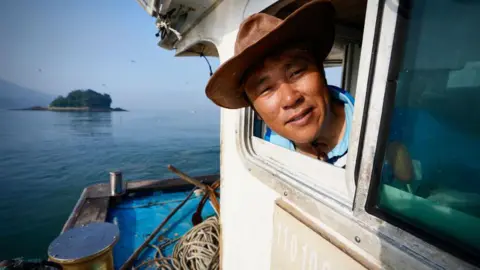 BBC/Hosu Lee
BBC/Hosu LeeBecause the problem is likely to get worse. Food and Agriculture Organization of the United Nations South Korea's total fish catch is projected to fall by nearly a third by the end of this century if carbon dioxide emissions and global warming continue on their current trajectories.
“The future looks very bleak,” said Captain Park, an anchovy fisherman now in his 40s. He recently launched a YouTube channel to document his catches in hopes of making some extra money. Park is the third generation of his family to do the job, and likely the last.
“Back then it was romantic to get up early and go to sea. There was a sense of adventure and reward.”
“It’s just really hard these days.”
Additional reporting by Hosu Lee and Leehyun Choi








